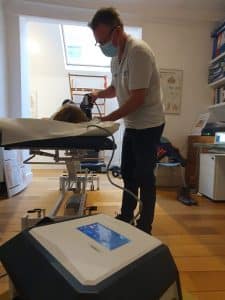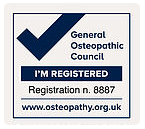Shockwave Therapy to treat Tennis Elbow
This is a Case Study detailing how Shockwave Therapy was used to very effectively treat a patient’s Tennis Elbow.
Patient presentation
This female patient presented to the practice in December 2023 with pain in the outer aspect of her right elbow. It had started in August of that year after practising overhead shots and serves. She was fit and active and regularly played tennis during the week and also did Body Balance. The patient had some physio in October ’23 which consisted of soft tissue massage and exercises but it had not helped. Pain was initially after a game but by December the patient could feel it during the day doing every day actions such as lifting a cup and it was painful by the end of the day and a throbbing pain had started to wake her up at night.
Assessment
Pain was noted in the lateral epicondyle on wrist extension and on resisted extension of the middle finger. There was also restricted external rotation at the shoulder and reduced rotation to the right in her upper body
Working Diagnosis
Lateral epicondylitis (Tennis Elbow)
Treatment
Two options were proposed.
Option 1
The first was a combination of soft tissue muscle release massage into the wrist flexors and extensors combined with specific medical acupuncture around the tendon area with the aim of improving blood supply and reducing muscle tension
Option 2
Shockwave Therapy (SWT). This has nothing to do with electric shocks. SWT uses compressed air to oscillate a small ball in a chamber. At one end of the chamber is a metal plate and the energy of the ball hitting the plate is transferred through the skin, to the target tissue. In this case the wrist extensor tendon.
Tendons are designed to respond to mechanical stimulation. The energy transferred creates micro-traumas in the tissues and the body responds by laying down new tendon and increasing blood supply in that area. The tendon also releases a chemical that blocks pain receptors so the patient will feel less pain.
Research has shown that 4-6 sessions over approx 4-6 week period significantly reduces pain around the tendon which allows patients to confidently start their rehab exercise programme.
The patient chose Shockwave Therapy. This consisted of 6 treatment sessions over a 5 week period. It was combined with some soft tissue massage into wrist extensors and flexors and exercises to improve range of movement in the right shoulder and upper back
Patient Outcome
After the first treatment the patient reported a significant reduction in pain. There was no night pain or pain during the day. Only on day 5 post treatment did the she feel some twinging pain on ironing a shirt.

A patient receiving Shockwave Therapy Treatment at Osteopathy Partnership practice Kingston
Treatment 2-4 continued to report continued reduction in pain and by the end of the 4th treatment the patient had returned to playing tennis and reported only slight discomfort on serving. There were no. ore pain points within the elbow or on the extensor tendons.
Each treatment was combined with soft tissue trigger point therapy and shoulder and upper back mobilisation to increase external rotation and so reduce loading at the elbow.
By treatment 5 the patient was playing competitive tennis matches pain free.
Summary
Shockwave Therapy for this patient’s Tennis Elbow was very effective. By also providing the patient with therapeutic exercises to Improve shoulder and upper back mobility the cause of the tennis elbow has also been addressed.
If you would like to know more about how Hugo and Shockwave Therapy can help you please call 0208 226 3767 or book an appointment here.


